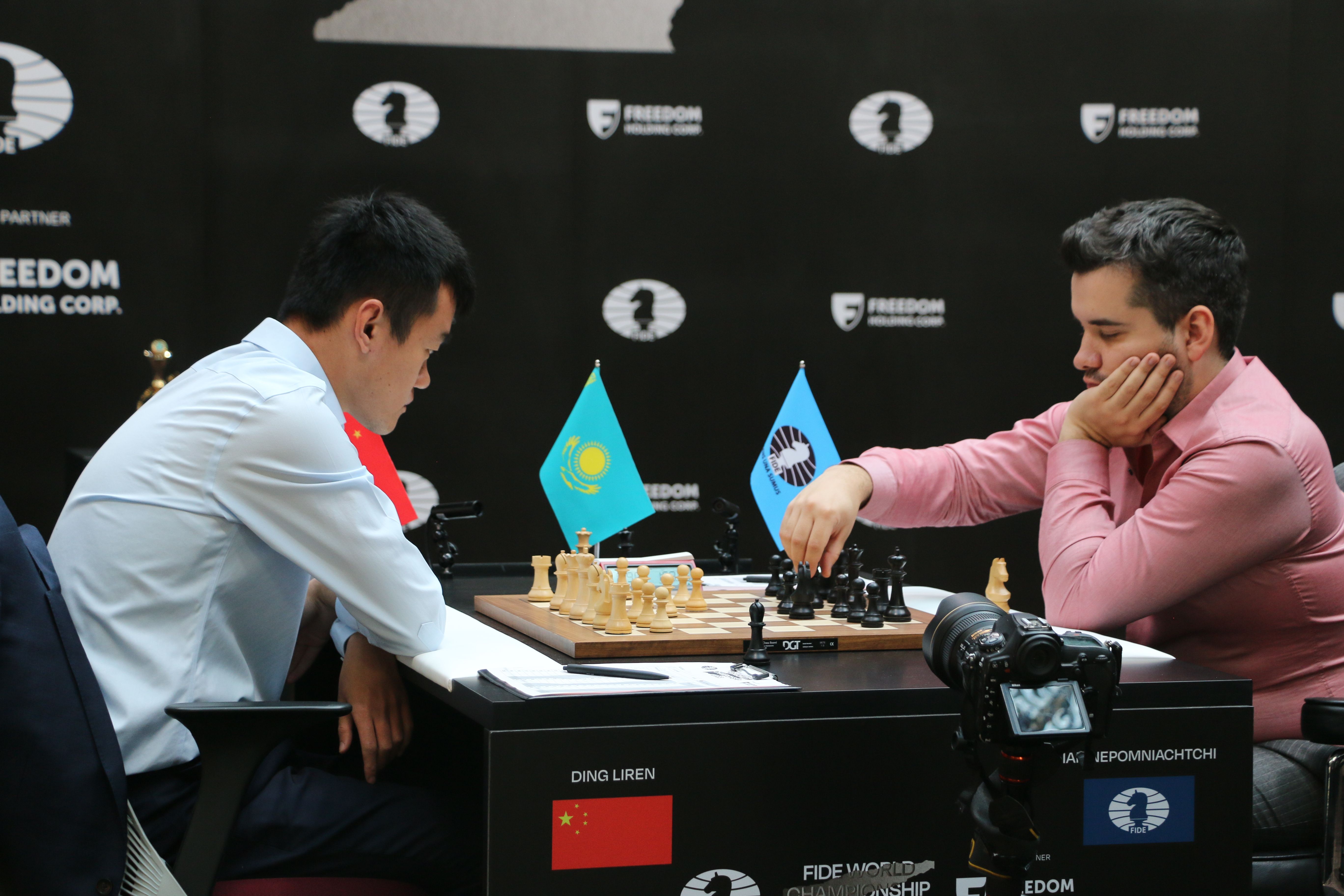
World Champion Carlsen On 'Shocking' Ding Choice, Risky Play, WC Format, & More
Days before he officially abdicates his title, GM Magnus Carlsen shared some fascinating thoughts about the 2023 FIDE World Championship.
While GM Ian Nepomniachtchi and GM Ding Liren have been battling it out in Astana to decide who succeeds him as world champion, Carlsen in contrast has enjoyed the good life showing off his skills in celebrity poker.
“I really need money to fund expensive habits like drinking, so I should probably take it pretty seriously,” Carlsen joked, according to the Wall Street Journal.
He then appeared on the red carpet as he handed out an award at the Breakthrough Prize ceremony in Los Angeles. The 9th edition of the show was hosted by James Corden and honors “scientists changing the world.” The Norwegian entered the stage to hand out an award along with "Emily in Paris" star Lily Collins in front of a crowd of Hollywood stars such as Kristen Bell, Danny DeVito, Robert Downey Jr., Gal Gadot, Ashton Kutcher, Brie Larson, Edward Norton, Leslie Odom Jr., and Chris Pine.
Watch the clip from the ceremony below.
His appearance on the Botez sisters' Twitch channel also drew some attention among chess fans as he stayed silent for a whole Titled Tuesday before missing out on first place after a draw with Alireza Firouzja and joking:
"I quit the f****** world championship for this?"
Since returning to Norway, the five-time world champion announced a new company and launched a Fantasy Chess app along with Norway Chess and appeared on Sjakksnakk, a Norwegian chess podcast hosted by his friends Askild Bryn and Odin Blikra Vea.
In the one-hour conversation, the soon-to-be former world champion shared his insight on a variety of subjects that will be covered in a follow-up article, but another highlight is his thoughts on the ongoing world championship match.
Episode 2 med @MagnusCarlsen er ute nå!
— Sjakksnakk (@sjakksnakk) April 28, 2023
Lytt på Spotify her:https://t.co/fCP80Rc93h
eller Apple Podcast:https://t.co/H2Jey1CkGT pic.twitter.com/ooMXnaFlYe
"I didn't follow any games live, but I went through the games, so I know how it's been going." Carlsen said before Ding's 6-6 equalizer.
He followed up by discussing his thoughts on why so many games in Astana have been decisive games, in stark contrast to his matches in 2016 and 2018, where 24 out of 26 games were drawn.
"I think a lot actually depends on what type of positions you get from the opening. If you get very complicated games, there will also be more mistakes. To a large extent that is what has happened. To get exciting games. I feel like in previous matches you have seen that my opponents, with Black especially, have chosen the absolute most solid lines, trying to kill the game and achieve as little play as possible, which is very fair and probably the best strategy you can have against me. "

"In addition, with White people have played relatively solid as well, not taking too many risks and putting the emergency brake on if there are any risks, with the exception of my match against Caruana, where my games with Black were very exciting. I think it's a lot about that. I think they feel to a greater extent that you can take more risks. I think all my opponents have felt that if I take the lead, they are in big trouble in the match. If I have a repertoire as Black that I know well, which I've had in the matches, it's extremely difficult to get a chance without taking huge risks. And if I lead and play with White, I won't take any chances. But here you have seen that none of them have been able to defend, so you can also take more risks."
Carlsen gave an example from game two of the match, which led to Ding's first loss.
"You can even risk... when Ding plays 4.h3 with White in the Queen's Gambit, he's saying, 'Ok, I want to play a completely unknown position, absolutely not better for me; it's not a safe position either, but just a complicated position that I hopefully will know better than my opponent.' It's a bit early to deviate like that. And it went very, very poorly in that game, but stuff like that you haven't seen much in my matches."
"It's been exciting to follow. I think it's about how complicated it is. I expected a higher defensive level, but I am very impressed by how they managed to create chances and how little they were able to or wanted to flatten the games as early as possible."
Carlsen also mentioned Ding's win with White in game six.
"It was quite shocking that Ding played the London. He was just better because Nepo played a line he didn't know. What happened with that? Quite strange."
Carlsen went on to talk about his strategy in his 2016 match against GM Sergey Karjakin, which ended with him winning 3-1 in the rapid playoff after 6-6 in classical.
"I've had matches myself, especially against Karjakin, where I thought I was so much better than him, that I should just try to push in every game as White or Black, to create a fight as much as possible. It increases the chance that I would lose some games, but I thought I would create more than enough chances that I would win the matches anyway. In the end, I didn't go for that strategy, and ended up like in my other matches: 'I am really solid with Black, good luck beating me with White.' And I was hoping that I would create chances with a few games as White at least. It wasn't very successful, so it's a lot of fun to see others going for a different strategy."
Carlsen, however, is clearly not a fan of classical chess and came out against the idea that "classical chess is doing well" due to the decisiveness of the match.
"There is a lot of talk now that this WC match proves that 'classical chess is doing well' and all that. I have to admit that I don't buy that at all. What you see here is that people don't try to be destructive to the same extent."
By "destructive," Carlsen refers to openings that give little room for risky play.
"It's something completely different when you try to be destructive. And you also see more and more how deep people have to dig to find playable ideas at all. Yes, to a certain extent we can still play classical chess, even on the world-championship level, but why should we be doing that when you have to dig so deep to make a game playable at all? Why not do something else that... how I see it, makes it more exciting and gives you more chess. Because you do in fact want to find the best chess player. The current format doesn't give you enough room for that. It's great that you have a match now where the players are not as destructive, which is good, but as I see it that doesn't mean the structural problems have been solved."
In part two of this article, we'll hear Carlsen's thoughts about his new identity without the title, some insight into the discussions with FIDE in Madrid, the winning formula in Dubai, his time with an A-list Hollywood star, his new focus on playing speed chess, his thoughts on young talents GMs Gukesh D, Praggnanandhaa R, Nodirbek Abdusattorov and Alireza Firouzja, his personal life, and much more.

